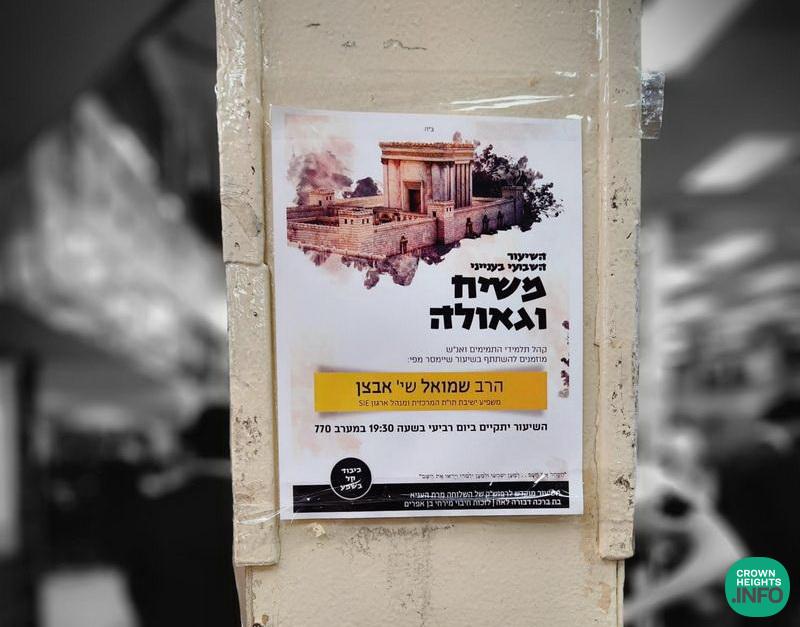
Weekly Dvar Torah: The Moshiach Alphabet
When the Rebbe spoke to us about the need to yearn for Moshiach with our whole truth, he gave us the best advice; start learning all about Moshiach. The Rebbe then listed several categories of texts, which to learn all about Moshiach.
1) Torah Shebiksav (written Torah), and Torah Sheba’al Peh (oral Torah), which explain all about Moshiach. 2) Pnimius Hatorah (the inner secrets of Torah), starting with the Zohar. 3) The teachings of Chassidus by our Rebbes. 4) Maamarim and Likkutei Sichos of the Rebbe. Which are a sample, an example and a preparation to the teachings of Moshiach. Who will teach the secrets of Torah, and the knowledge of G-d.
The Noda Beyehuda, R’ Yecheskel Landau of Prague, has a beautiful explanation for this last category in his introduction to his classic on Gemara, the Tzlach.
He writes:
“Many ask, why are we wasting time studying Agada in the Gemara. The stories are so fantastic, peculiar and incredible, that we don’t understand them anyway, and they have no relevance in our day to day lives.
“Let me explain with a parable. A group of people were sailing on a ship, and there was a pregnant lady amongst them. Unfortunately, a fierce storm threw the boat onto an island, and the ship wrecked. They ended up being stranded on that desolate island. They were completely cut off from the world. They acclimated themselves on the island, and managed to survive.
“The baby was born and started growing up on that island, with nothing more than the mere survival tools that they had. He knew of nothing but heaven and the earth, and the few people around him.
“As he was growing up, one of the wise men in the group sat the child down on the ground, and he drew a shape with his finger in the sand, and he told the child this is an Alef. Then he drew another shape and he told the child, this is a Beis. You should know that when you know the alphabet you’ll be able to read and acquire knowledge.
“The child became restless and angry. “Why are you telling me this?” The man explained; “there is a world out there, and one day you will be able to read books and acquire a lot of knowledge.” But the child could never understand what was the relevance to him knowing the alphabet and how to read.
“Finally, after many years G-d had mercy, and a ship rescued them and brought them back to civilization.
“Once in the real world, the child saw books and was able to read. He was fascinated to learn wisdom and all kinds of information. Suddenly he realized, “if not for the stubborn old man that insisted on teaching me how to read, I would never have been able to learn all this amazing knowledge. How grateful I must be to this old man.”
The Noda Beyehuda continues; “the same will happen when Moshiach will come and all the secrets will be revealed. Then we will be able to understand all the revelations, because we will have learned all of this in the Agada of the Talmud. We will know the alphabet with which to read and understand the secrets of Torah.”
The Noda Beyehuda concludes; “I heard from the Tzadik R’ Noach of Brod, that we must learn about the 10 Sefiros, 32 paths of Chochma, 50 gates of Bina, and the 3 pillars of kindness, judgement and mercy, even if today we have no ability to really comprehend their meaning. But when the day comes and the secrets will be revealed, we will have mastered the language, because we have familiarized ourselves with them now. Otherwise how will we benefit from these great G-dly revelations.”
Coming from the Noda Beyehuda, this is especially noteworthy, because it is commonly accepted that he was not a Chosid, and here he is encouraging the study of Kabbalah and Chassidus as a preparation for the revelation of Moshiach.
So too, the Rebbe is giving us the tools with which to prepare for Moshiach. He is giving us directions on how to get into the spirit of Moshiach. He is enabling us to get a foretaste of the teachings of Moshiach, so that we should want more and even more. This way we will really want and need Moshiach, and we will pray for him with our whole truth.
Have a Moshiachdike Alphabet Shabbos,
Gut Shabbos
Yosef Katzman










